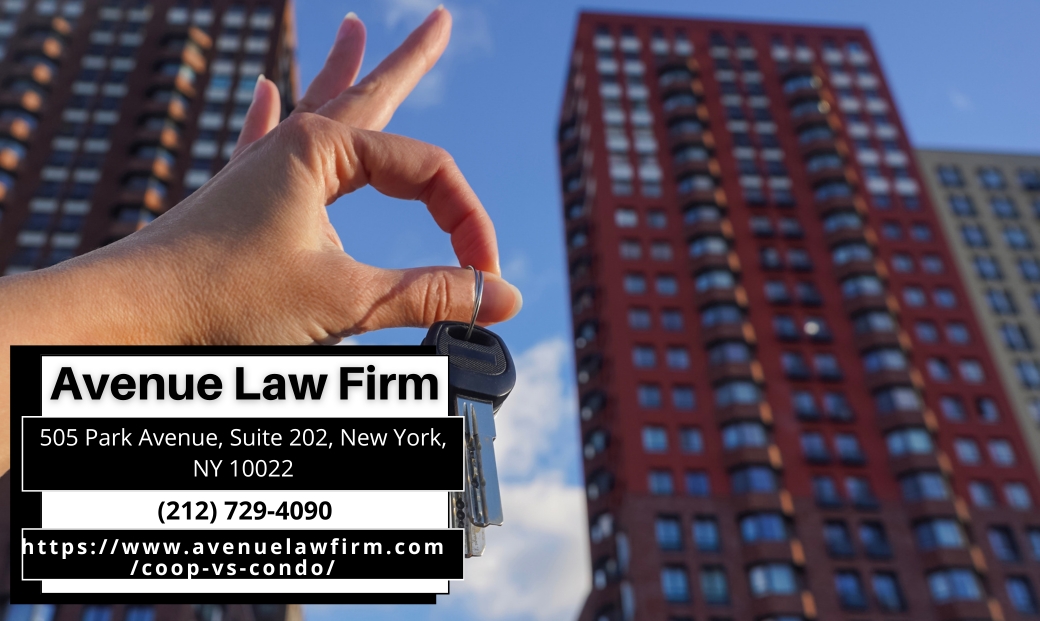Navigating New York City’s real estate market often means choosing between two of its most common housing options: condominiums and cooperatives. In a newly released blog post titled “CONDO vs COOP,” NYC real estate attorney Peter Zinkovetsky (https://www.avenuelawfirm.com/coop-vs-condo/) of Avenue Law Firm delivers a comprehensive breakdown of the legal and practical distinctions between these property types. This analysis offers valuable insight for prospective homebuyers evaluating their residential investment options in the city.
As an NYC real estate attorney, Zinkovetsky opens the blog by highlighting the unique structure of the local housing market, where co-ops make up nearly 70% of all residential buildings. In contrast, condos dominate among newer developments from the last two decades. His detailed discussion explores the legal ownership models, financial obligations, and lifestyle implications that separate these two housing types. “The main difference between a condo and a co-op is ownership structure,” he explains, with condos involving direct deed ownership and co-ops representing a share in a corporation that owns the building.
For those engaging a NYC real estate attorney for the first time, Zinkovetsky stresses the importance of understanding not only the upfront costs but also long-term financial responsibilities. The blog explains how condo owners pay property taxes directly, while co-op residents contribute through monthly maintenance fees, which typically include a portion of the building’s property tax. Additionally, condo buyers face higher closing costs due to required title insurance and mortgage tax, whereas co-op purchases usually exclude those expenses.
Avenue Law Firm’s blog further emphasizes the role of an NYC real estate attorney in assessing market trends and investment value. According to Zinkovetsky, recent data show a notable rebound in co-op sales as buyers seek stable, long-term housing, while condos continue to attract international and investor buyers due to fewer restrictions and higher liquidity. He notes that condos remain popular because of simplified purchasing procedures and the ability to sublet more freely, advantages that often outweigh their higher purchase prices for certain buyer profiles.
Beyond pricing and ownership, Zinkovetsky provides a clear explanation of monthly cost structures, insurance requirements, and resale value differences. While co-ops may have stricter approval processes and more powerful boards capable of rejecting buyers without disclosure, they offer a more cost-effective entry into the housing market. Condos, on the other hand, provide a faster path to ownership and fewer constraints on resale, making them a desirable option for investors and short-term residents.
The blog also touches on subtler lifestyle considerations that can impact a buyer’s decision. Zinkovetsky describes how condos often come with luxurious, modern amenities such as gyms, pools, and concierge services, especially in newer developments in areas like Battery Park and the Financial District. In contrast, co-ops tend to occupy pre-war buildings with classic features such as fireplaces and crown moldings, commonly found in neighborhoods like the Upper East Side and Gramercy Park.
Another factor explored is board control and governance. An NYC real estate attorney is often called upon to navigate the approval process in co-op purchases, which can be extensive and involve strict financial scrutiny. Zinkovetsky explains that boards in co-ops can deny a buyer for any lawful reason without needing to provide an explanation. In contrast, condo boards have limited power in sales decisions, only exercising the "right of first refusal," which rarely results in blocking a sale.
On the topic of insurance, Zinkovetsky explains the distinction between the coverage needs of condo and co-op residents. Condo owners must insure their individual units and personal belongings, while co-op shareholders focus more on personal property coverage, as the building itself is insured by the corporation. Misunderstandings about the scope of board-managed insurance policies often lead to underinsured units, making it essential to secure individual coverage.
With so many variables influencing the purchase of a condo or co-op in NYC, Avenue Law Firm encourages prospective buyers to seek qualified legal counsel. Zinkovetsky’s in-depth blog concludes with practical advice for navigating the purchasing process, from understanding board approval to evaluating financial liabilities. “Deciding between a co-op and a condo in New York City can be difficult,” he writes, underscoring the importance of evaluating ownership structures, legal obligations, and long-term housing goals.
For individuals planning a property purchase in New York City, legal support can play a vital role in minimizing risk and ensuring an informed transaction. Avenue Law Firm, led by NYC real estate attorney Peter Zinkovetsky, offers buyers guidance through every step of the process, from reviewing contracts to preparing for board interviews and closings.
About Avenue Law Firm:
Avenue Law Firm focuses on real estate transactions in New York City. With a dedicated legal team including NYC real estate attorney Peter Zinkovetsky, the firm assists clients in buying, selling, and managing residential properties, including condos, co-ops, and condops. Avenue Law Firm provides legal support to clients seeking clarity and confidence in the city's dynamic housing market.
Embeds:
Youtube Video: https://www.youtube.com/watch?v=wgMWgQxqFKo
GMB: https://www.google.com/maps?cid=14223199020890935024
Email and website
Email: peter@avenuelawfirm.com
Website: https://avenuelawfirm.com/
Media Contact
Company Name: Avenue Law Firm
Contact Person: Peter Zinkovetsky
Email: Send Email
Phone: (212) 729-4090
Address:505 Park Ave Suite 202
City: New York
State: New York 10022
Country: United States
Website: https://avenuelawfirm.com/

